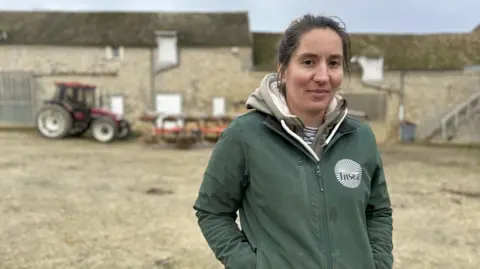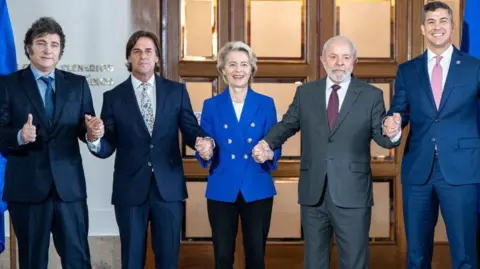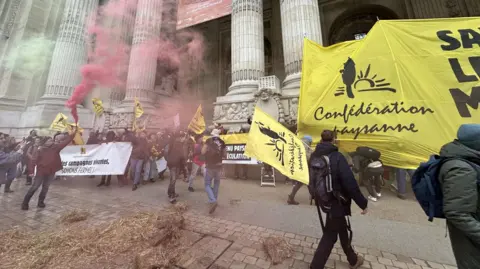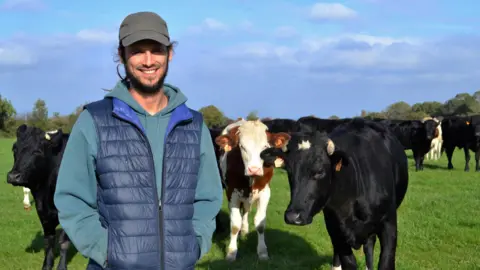This website uses cookies so that we can provide you with the best user experience possible. Cookie information is stored in your browser and performs functions such as recognising you when you return to our website and helping our team to understand which sections of the website you find most interesting and useful.

 Lisa Louis
Lisa LouisAs the ink was drying on one of the world's biggest trade deals, signed in Uruguay this month, and hailed as a milestone for the global economy, anger was brewing thousands of miles away in France.
Under the agreement between the EU on one hand, and Argentina, Brazil, Paraguay and Uruguay on the other, tariffs will be greatly reduced and the amounts of imports and exports allowed will be increased.
The deal would affect almost 800 million people.
It comes as a marked contrast to Donald Trump's plans to greatly increase protectionism when he returns to the White House next month.
The deal still needs to be approved by the 27 EU member states, and France is planning to block it, due to fears that it will harm its farming sector.
Alix Heurtault, a 34-year-old French farmer, says she is worried about her future if the planned agreement goes ahead.
"I fear that the deal will mean making ends meet becoming even more difficult for farmers like me," she says.
As a result, she is crossing her fingers that the French government will be able to stop it.
The planned trade agreement will mean more South American beef, chicken and sugar coming to the EU, and at lower prices. While in the opposite direction, the likes of European cars, clothing and wine would have more access to the Mercosur zone.
For France to block the deal it will need to persuade at least three other EU countries, representing at least 35% of the total population to join it. Ireland, Poland and Austria are also opposed, but Italy will likely need to also come on board to achieve the required population quota.
And with the media giving very conflicting reports about Italy's position, we'll have to wait and see which way the Italians go when the vote is held some time in 2025.
 Getty Images
Getty ImagesIn the meantime, French farmers are continuing to put pressure on Paris to not back down. French President Emmanuel Macron is listening, and has described the trade deal as "unacceptable in its current form".
Ms Heurtault grows sugar beet, wheat and barley on a 150-hectare farm in the small village of Villeneuve-sur-Auvers located 60km (37 miles) south of Paris.
She says that the deal would see French farmers badly hit in order to help EU manufacturers. "It feels like we're a bargaining chip. Farmers in the Mercosur countries [the name of the Argentina, Brazil, Paraguay and Uruguay block] have less restrictions regarding pesticides and lower labour costs."
Ms Heurtault's view is widely held across the French farming sector, which has been holding regular protests in recent months.
A few weeks ago some 200 farmers dumped bales of straw in front of the Grand Palais museum and exhibition centre in Paris.
They lit up red flares, and chanted slogans like "We are feeding you, show us some respect".
The protest was held to coincide with an annual meeting of commodities importers and exporters taking place at the venue.
Stéphane Gallais, a cattle farmer and the national secretary of farmers' union Confédération Paysanne, which had organised the event, explained why it was being held.
"Today's demonstration is a stance against free trade, especially the EU-Mercosur agreement that we've been opposing since it was first discussed in the late 1990s," he said.
 Lisa Louis
Lisa LouisWhile France is opposed to the trade deal, other EU nations, such as Germany, Spain and Portugal are strongly in favour of it.
Proponents welcome the fact it would be a marked contrast to Trump's threats of increased protectionism.
"It would be a good signal at a time when we have movement in the opposite direction towards economic fragmentation and protectionism, especially with free-trade sceptic US President Donald Trump re-elected," says Uri Dadush, a research professor for trade policy at the University of Maryland in the US.
Prof Dadush adds that while European farmers will be negatively impacted, he says this will be very limited.
"The deal is a threat for European farmers, as the world's most competitive agricultural sector gets access to their market, but we're talking about a tiny amount of liberalisation spread out over a long period of time," he says.
He points out that under the agreement the Mercosur nations would still have limits on what they can export to the EU. Such as their proposed initial increased annual quota of beef exports still only accounting for less than 1% of EU consumption of the meat.
Prof Dadush adds that "the deal is an opportunity to push for much needed market-orientated reform in the heavily-subsidised EU agricultural sector, and Mercosur's highly-protected factory sector".
Chris Hegadorn, adjunct professor for global food policies at Paris-based university Sciences Po, and former secretary of the UN's Committee on World Food Security, says the agreement would overall be beneficial to Europe – including its farmers.
"It obviously depends on the subcategory you're looking at, but French cheese and wine producers will benefit," he says.
He adds that it will also improve health and environmental standards in the Mercosur countries, and increase ties with the EU at a time when "China is also trying to get a foothold in Latin America".
But David Cayla, lecturer for economics at Angers University in western France and member of the left-wing collective "The Dismayed Economists", doubts the EU will be able to enforce higher standards in Latin American countries.
"It's impossible to control their implementation," he says. "Our farmers will only face increased competition from countries with a better climate and more fertile soils.
"But we need to protect European agriculture – that's also a question of food sovereignty," he emphasizes, adding that the Covid-19 pandemic showed how quickly worldwide supply chains could collapse in times of crisis.
 Lisa Louis
Lisa LouisAntoine Gomel, who in 2017 took over his family's 24-hectare chicken and beef farm in a small village near Boulogne-sur-Mer in northern France, says that opposing the trade deal is about saving the French countryside.
"Farms keep disappearing leaving our villages deserted – the deal will only accelerate that," says the 42-year-old.
"But farms are crucial to cohesion in the countryside, not least as they create jobs. People in France and abroad increasingly vote for the far right because they feel disorientated and alone.
"Farms can contribute to bringing them back together, by literally anchoring them."
Back in front of the Grand Palais in Paris, cleaners were sweeping away the remaining straw from the protesters.
Farmer Stéphane Gallais was still nearby, watching them. "The EU-Mercosur deal is highly detrimental and it would be really symbolic if EU member states didn't ratify it," he said.



 Africana55 Radio
Africana55 Radio 

